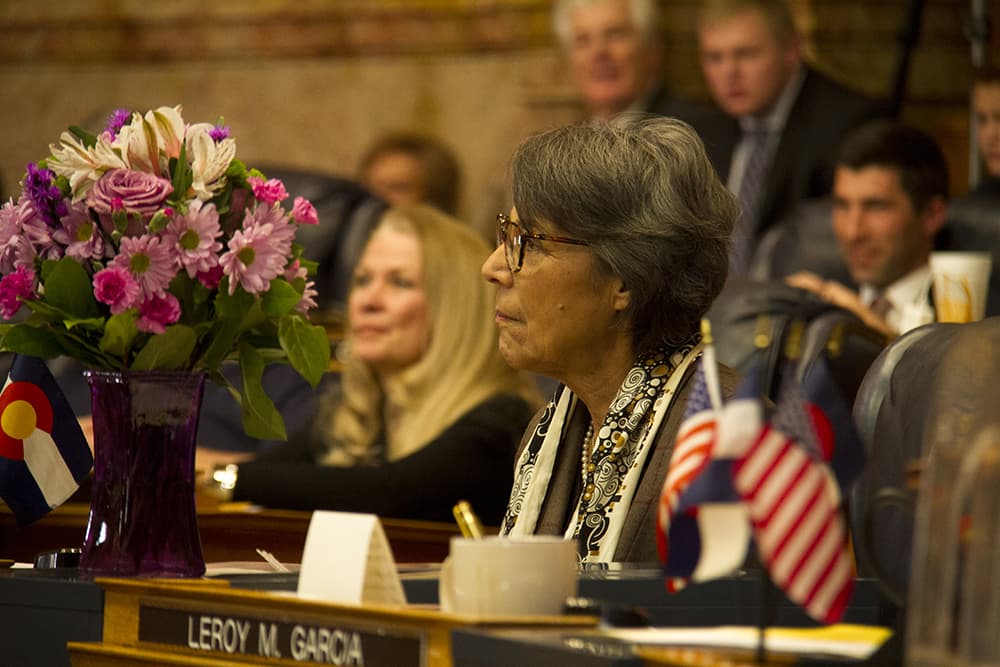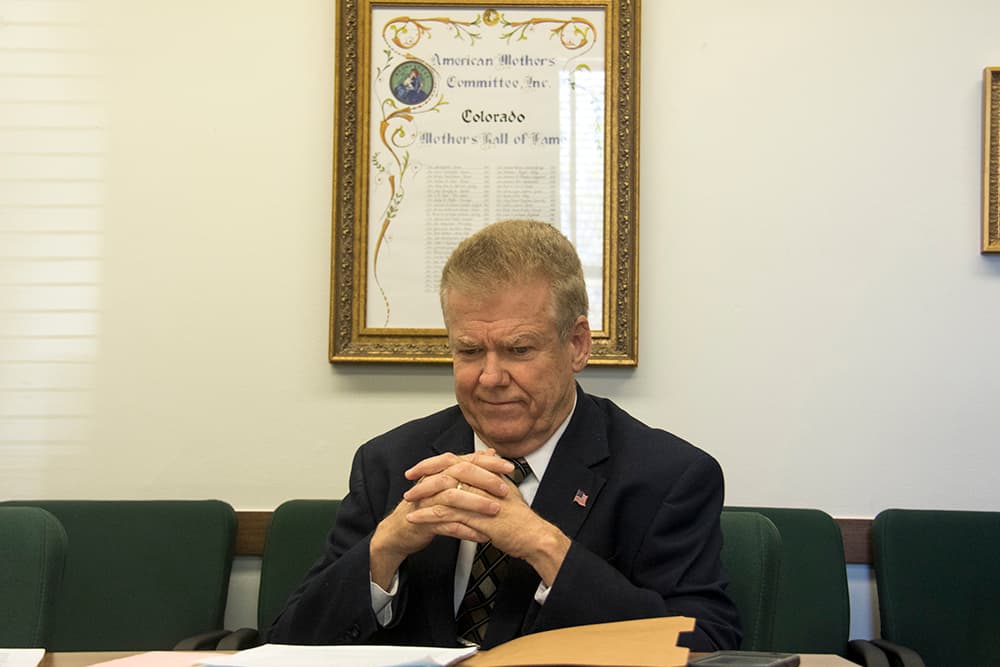
A bill that would restore funding to hospitals, restructure the budget to provide more money for rural schools and roads -- and that would mortgage state-owned buildings and ask for across-the-board cuts in the rest of the budget to do it -- moved forward Tuesday, but the Senate Finance Committee barely touched the issue that will decide the fate of this significant proposal.
The state senators who voted yes indicated their support was conditional on how the bill develops over the remaining weeks, with Democratic Sen. Lois Court of Denver saying she was a "yes for today" because she wants the conversation to continue and Republican Sen. Owen Hill of Colorado Springs saying his "support will quickly turn into opposition" if Democrats refuse to reduce spending in other areas.
The author of SB 267, Republican Sen. Jerry Sonnenberg of Sterling acknowledged the final form of the bill will be determined more by politics than policy. The numbers that matter aren't the millions in spending described in the bill but "33, 18 and one," the number of votes it will take to pass the House and Senate and get the governor's signature.
This bill exists because the proposed state budget reduces the hospital provider fee by $264 million.
The money is generated by a 6 percent fee on patient revenue. It gets matched by federal dollars and redistributed to hospitals to increase compensation for Medicaid patients. With the federal match, hospitals will lose out on $520 million for 2017-18, with rural hospitals especially hard hit, if the budget is approved as proposed.
And the reason the budget reduces the hospital provider fee is to reduce the total amount of money the state collects so that it won't go over the revenue cap imposed by the Taxpayer's Bill of Rights. If the fee weren't reduced, the state would have to issue refunds to taxpayers, with cuts to other parts of the budget to pay for them.
The bill, called "Sustainability of Rural Colorado," reclassifies the hospital provider fee into an enterprise fund, making it a distinct kind of government business operation not subject to TABOR. This would protect hospital funding not just in this budget but in future years and stop the fee from affecting the rest of the budget. Democrats have tried to do this for several years -- unsuccessfully -- because many Republicans view it as an end-run around TABOR.
In addition to reclassifying the fee, SB 267 would:
- Lower the TABOR revenue cap that applies to the budget by $670 million;
- Require all departments to submit budgets for 2018-19 that are 2 percent lower than the previous year;
- Take general fund money that currently goes to transportation and give it to rural schools for the next three years;
- And issue certificates of participation -- a kind of debt -- on state-owned buildings to fund a $1.7 billion bond package, with 77 percent of the money going to transportation and 23 percent going to other capital projects (an amendment from Sen. Jack Tate increased the total from $1.35 billion in the original bill and allocated a larger share for non-transportation capital needs).
The transportation funding represents about half as much money as the proposed sales tax for roads and transit that is making its way through the legislature. This proposal is more weighted toward rural communities and doesn't need to get a tax increase past voters.

Senate Minority Leader Lucia Guzman, a Denver Democrat who dropped her own hospital provider fee bill to co-sponsor Sonnenberg's bill, called it an "opportunity for our parties to come together" and a compromise that "speaks to our core values."
Sonnenberg opposed the hospital provider fee in the first place and opposed previous efforts to reclassify it, but he asked his fellow Republicans to leave that fight in the past.
"We are dealing with the unintended consequences of an expansion of health care and a mandate from the federal government," he said. "In order to not have an unfunded mandate and get those federal matching dollars, this is what we are left with. ... Whether you think it’s a tax or a fee doesn’t matter in this discussion. This is the law now."
Administrators of rural hospital and school systems told the committee about the dire straits in which they find themselves.
Many hospitals that serve rural communities see a lot of Medicaid recipients, and they depend on additional revenue from the hospital provider fee to cover costs. If a hospital closes -- and some might -- people and ambulances would have to drive more than 100 miles to the next one. In many communities, the hospital system is also a major employer in poor regions where other job opportunities are limited.
Konnie Martin, CEO of the San Luis Valley Health system, said her margin last year was 1.3 percent, around $700,000, while the system of hospitals and clinics now faces a loss of $4.2 million.
"We would go from a solidly run health care system to one in jeopardy," she said.
And that could have devastating consequences.
"Where we live in this state should not determine if we live," she said.
Sen. Tim Neville, a Littleton Republican and chair of the Finance Committee, asked an illuminating question about how hospitals became so dependent on this funding stream that didn't exist a decade ago.
He also questioned whether taxpayers should be subsidizing construction like the expansion of Children's Hospital Colorado into a new facility in Colorado Springs.
"I understand you see a business opportunity, but my question from a taxpayer’s perspective is if Colorado Springs is underserved," he said, adding that his constituents see "a lot of cranes."
Greg Raymond, a regional vice president for Children's Hospital Colorado, Southern, said the expansion isn't a business opportunity because most of the patients who would be served are already being seen on the Anschutz campus. The Colorado Springs facility would let children from the southern part of the state be treated closer to home and reduce wait times at the Anschutz campus for patients in the Denver metro area.
Martin said that her system used the additional revenues to replace equipment and improve operating rooms that hadn't changed in 25 years. They also added 24/7 orthopedic surgery coverage so that people who had car accidents and farm accidents could be treated no matter what time of day it was and added neurology, cardiology and oncology, services for which patients previously had to drive to Pueblo.

Neville was not persuaded. He cast the lone no vote on the committee.
"We have met the enemy and it is us, as the legislature," he said. "... I wish I could say this is the solution to these problems or even a bandage, but it is not. ... And I do feel this is a creative way of avoiding going to the taxpayers and asking them what we should ask them: Do you want to increase taxes or increase debt? And I continue to believe the hospital provider fee is a hidden bed tax."
The committee barely touched upon the elephant in the room, the reduction in the TABOR revenue cap.
To be really clear, the bill as written would require cuts in other parts of the budget to make up for the hospital provider fee, even though the state has enough tax revenue that it doesn't need to make cuts just to balance the budget. It would also set a lower base from which future budgets could grow. This is "a problem" for Democrats, as House Majority Leader K.C. Becker put it a few weeks ago.
"It puts a $100 million hole in the budget that we just approved after much debate," said Court, who added that she has "grave concerns" with the bill as written.
And for Hill and likely many Republicans, that reduction is the "lynchpin" for this whole deal.
"If we turn it into a form of the bill we pretty soundly rejected last year under TABOR, my support for this bill will quickly turn into opposition," he said.
But he did suggest a smaller number, perhaps $350 million instead of $670 million.
The bill goes to the Senate Appropriations Committee, then to the full Senate. If it passes there, it goes to the House, where amendments to change the reduction in the TABOR cap are likely. The question then is whether the two versions can be reconciled.













